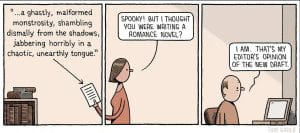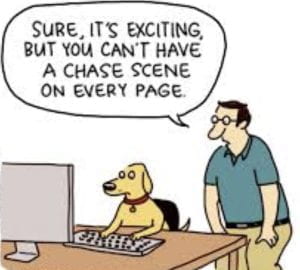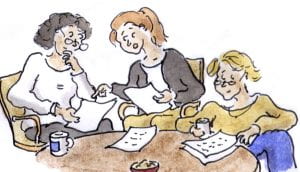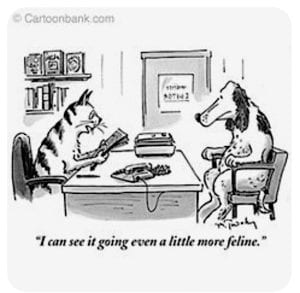Judy writes, “I just finished your book about 10 minutes ago….wow….it had me on the edge of my seat…it was a fantastic read!!!!!”
Always a joy to get these comments and makes writing worth the effort.
Judy writes, “I just finished your book about 10 minutes ago….wow….it had me on the edge of my seat…it was a fantastic read!!!!!”
Always a joy to get these comments and makes writing worth the effort.

 A reader today said she couldn’t put my book down and had read eight chapters while we were out for lunch. For a writer, that’s the best feedback ever.
A reader today said she couldn’t put my book down and had read eight chapters while we were out for lunch. For a writer, that’s the best feedback ever.
 A technique enjoyed by thriller writers is to end each chapter with tension—the kind that makes readers want to turn the page. Along with short chapters, this maintains drama. I get that as a writer, but I also enjoy sudden events. Life is a mix of calm, solitude, relationships, drama, and sudden events or surprises. I would like to think that this reflects in my writing. Here’s some examples of chapter endings from my new book as examples of the different levels of tension. The context is onboard a submarine, under the Arctic.
A technique enjoyed by thriller writers is to end each chapter with tension—the kind that makes readers want to turn the page. Along with short chapters, this maintains drama. I get that as a writer, but I also enjoy sudden events. Life is a mix of calm, solitude, relationships, drama, and sudden events or surprises. I would like to think that this reflects in my writing. Here’s some examples of chapter endings from my new book as examples of the different levels of tension. The context is onboard a submarine, under the Arctic.
Jerry replied in a hushed tone. “If you enter this dark, cold world without a proper ceremony, the King of Ice will pour his wrath on you all. Get to your quarters and into your swimsuits. Be back here by 1700 hours. That gives you twenty minutes. Now go.”
and
Everyone nearby watched, fascinated as Kim’s steady hand scanned back and forth on the large amplifier dial, calibrating the ambient noise, temperature, and depth. She cross-checked the kinematic parameters—speed, direction, and even the supersonic sound waves. The computer was busy, looking for a match in Hammerhead’s extensive database.
Kim was honing in on the rogue visitor. Just a few more adjustments and a result jumped onto her screen.
“Got ya,” she bounced in delight, ripping off her headphones.
and
“Three-five-zero feet and closing.”
“Damn.”
Sailors perspired and clenched their fists. Movements around the Control Room slowed.
Bus Driver whispered the numbers, “Three-three-zero feet, three-zero-zero feet, two-seven-five—hell, we’re going to collide.”
Hawkeye froze, waiting for the sound of metal on metal or, worse, the sound of water flooding the room.

Solomon was among the wisest who ever lived. He is the one who said “Nothing is truly new; it has all been done or said before.” (Ecclesiastes 1). Does that mean that there is nothing original to be written? Yes, but no. It’s not the idea (or plot) that needs to be original; it is the way it is written—that is, the ‘voice’ of the story. The way the story is told brings a fresh perspective to old tropes. Voice is the vocabulary, tone, point of view, style and sentence flow. Voice is the length of chapters, the way the plot is arranged and the words used; the way characters are built. Now, there is another aspect to originality and that is ‘imagination.’ Radio is the perfect example and a novel almost as good. When I listened to radio as a youngster, my imagination soared and was scared by sound effects, such as a blood-curdling scream; or excited by the approaching siren of a cop-car coming to the rescue. Today, readers are fewer, but just as hungry for novels that ignite the imagination and, to sum up, originality in writing is the perfect vehicle to bring it to the page. The wonderful thing about writing is that it is a window that opens onto the world, yet each window shows a different view—a unique, original view for the mind. The best writing is a wider window that opens a wider view.
Robert Putman (paraphrased) made a staggering statement: ‘As a rough rule of thumb, if you belong to no writing group but you decide to join one, you cut your risk of giving up over the next year in half.’
 Let’s refocus the statement. Who is your champion—who spurs you on and keeps you focused? Why gives you encouragement in your writing, and feedback to improve? Where do you turn when you have received a reject and who do you rejoice with when you get asked for a full? That’s right, you need to be connected to a group, or someone who cares.
Let’s refocus the statement. Who is your champion—who spurs you on and keeps you focused? Why gives you encouragement in your writing, and feedback to improve? Where do you turn when you have received a reject and who do you rejoice with when you get asked for a full? That’s right, you need to be connected to a group, or someone who cares.
I’m fortunate; I have a loving wife who has never given up on my writing, even when I send her another revised chapter; and I am thankful for a friend who gives me fast feedback; and an editor who polishes my writing as much as the shoe-shine guy in Lisbon who rubbed my shoes so much I thought a genie might pop out.
 What value do I place on a professional editor? HEAPS!
What value do I place on a professional editor? HEAPS!
I value any feedback from readers, but place high value on corrects and suggestions from a professional editor—one who is connected with publishing and knows what to look for in a ‘good read.’ I have used the same editor for my partial reviews, synopsis and query letter and her ideas on my plot and characters has given me insights that I missed. The edits have also allowed me to correct weaknesses quickly and the end result is a far more polished manuscript. I don’t always agree with the suggested corrections, but use them to improve the areas noted. Above all, having a professional (paid) editor gives me encouragement as a writer and, I must confess that without her, I would have given up long ago. Here are a couple of feedback examples:


One definition: A thriller is a fast-paced novel full of conflict, tension, suspense, unexpected twists, and high stakes. Every single scene and element in a thriller is meant to propel the action forward, test the characters, and take the readers on a roller coaster ride that will leave them on the edge of their seats. I was visiting technology schools in California a few years ago and my companion and I rushed off to enjoy a roller coaster ride, straight after breakfast. By the time I had been thrown around and tossed up and down, I felt physically sick. It might have been the big breakfast! This raises an interesting thought—how much of a wild ride do good thrillers have to have? For some, the pace is never too fast; for others, a more measured rise in tension is preferred. I think I’m in between. I like twists and turns, yet also building tension. And, I am over plots that are too far fetched. For me, the action must be real, or plausible. The bottom line is that a thriller needs to have thrills, no matter what the ride is like.
